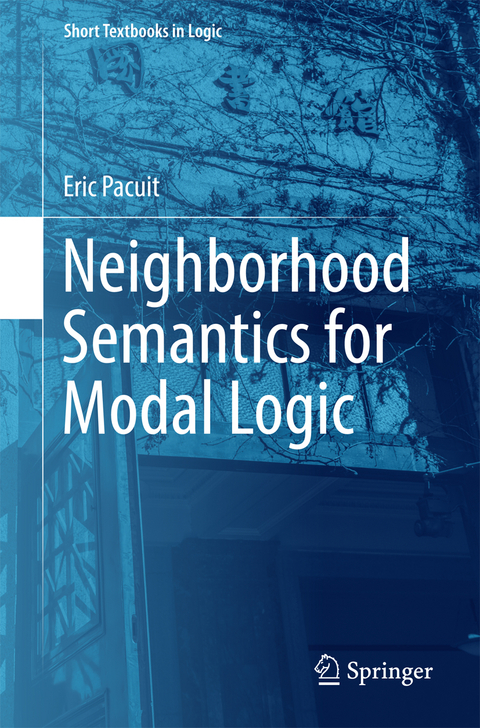
Neighborhood Semantics for Modal Logic
Springer International Publishing (Verlag)
978-3-319-67148-2 (ISBN)
In addition, the book discusses a broad range of topics, including standard modal logic results (i.e., completeness, decidability and definability); bisimulations for neighborhood models and other model-theoretic constructions; comparisons with other semantics for modal logic (e.g., relational models, topological models, plausibility models); neighborhood semantics for first-order modal logic, applications in game theory (coalitional logic and game logic); applications in epistemic logic (logics of evidence and belief); and non-normal modal logics with dynamic modalities.
The book can be used as the primary text for seminars on philosophical logic focused on non-normal modal logics; as a supplemental text for courses on modal logic, logic in AI, or philosophical logic (either at the undergraduate or graduate level); or as the primary source for researchers interested in learning about the uses of neighborhood semantics in philosophical logic and game theory.
Eric Pacuit is an Assistant Professor of Philosophy at the University of Maryland, USA. Before coming to Maryland, Eric worked at Stanford University, USA; at the Institute for Logic, Language and Computation at the University of Amsterdam, Netherlands; and at the Tilburg Institute for Logic and Philosophy of Science at Tilburg University, Netherlands. His research primarily addresses issues in interactive epistemology and group decision-making – two interdisciplinary areas that make use of ideas and techniques from logic (especially modal logic), philosophy, game theory and social choice theory. His research has been generously supported by a grant from the National Science Foundation and a VIDI grant from the NWO (the Netherlands Organization for Scientific Research).
Introduction and Motivation.- Subset Spaces.- Language and Semantics.- Why Non-Normal Modal Logic?.- Core Theory.- Richer Languages.
"Neighbourhood frames offer an interpretation to systems of modal logic that generalises the more traditional relational frames. ... Complemented with the numerous pointers to the literature that it provides, the book will be a valuable source of information and practice for PhD students." (Éric Martin, zbMATH 1390.03001, 2018)
"Reading and writing a review of this wonderful book has been a pleasure. Knowing the basics of propositional modal logic may explain why I enjoyed reading it. The author has gathered and surveyed many papers in writing this book. This is a must-read for those who want to do research on neighborhood semantics--after having acquired a basic knowledge of modal logic." (Manoj K. Raut, Computing Reviews, February, 2019)
| Erscheinungsdatum | 08.12.2017 |
|---|---|
| Reihe/Serie | Short Textbooks in Logic |
| Zusatzinfo | XII, 154 p. 17 illus. |
| Verlagsort | Cham |
| Sprache | englisch |
| Maße | 155 x 235 mm |
| Gewicht | 266 g |
| Themenwelt | Geisteswissenschaften ► Philosophie ► Allgemeines / Lexika |
| Geisteswissenschaften ► Philosophie ► Logik | |
| Schlagworte | Bisimulations for neighborhood models • Coalitional Logic • Comparing normal and non-normal modal logic • computer architecture & logic design • Computer architecture & logic design • Computer programming / software engineering • conditional logic • Dynamic Logic of Evidence-Based Beliefs • epistemic logic • game logic • Lewis Sphere Models • Logic • Logic and Game Theory • Logics and meanings of programs • Mathematical and Computational Engineering • Mathematical Foundations • Mathematical Logic • Mathematical Logic and Foundations • Mathematical theory of computation • Mathematics of Computing • Maths for computer scientists • Maths for engineers • Neighborhood Semantics for First-order Modal Logic • Neighborhood Semantics for Modal Logic • Non-normal Modal Logic • Philosophy • Philosophy: logic • Possible world semantics • Relational models with impossible worlds • Relational semantics for modal logic • Religion and Philosophy • Scott-Montague Semantics • Subset space logic • Topology and Modal Logic • Weak systems of common belief • Weak Systems of Modal Logic |
| ISBN-10 | 3-319-67148-0 / 3319671480 |
| ISBN-13 | 978-3-319-67148-2 / 9783319671482 |
| Zustand | Neuware |
| Haben Sie eine Frage zum Produkt? |
aus dem Bereich


